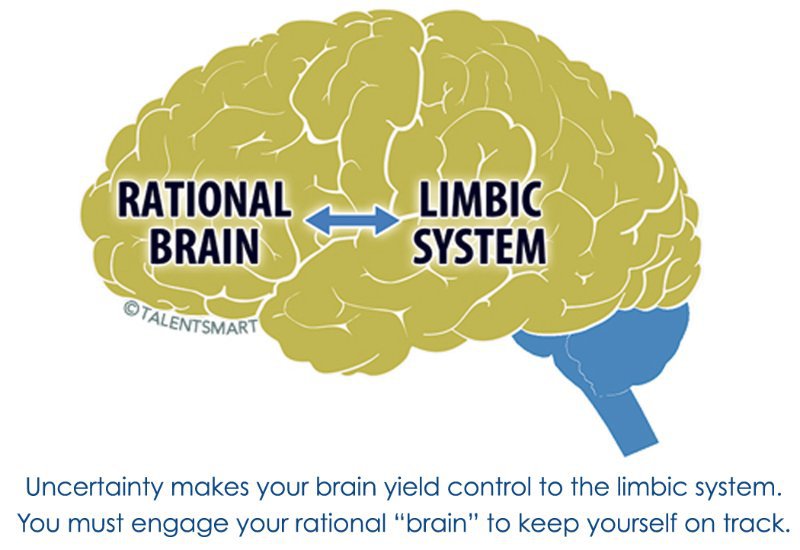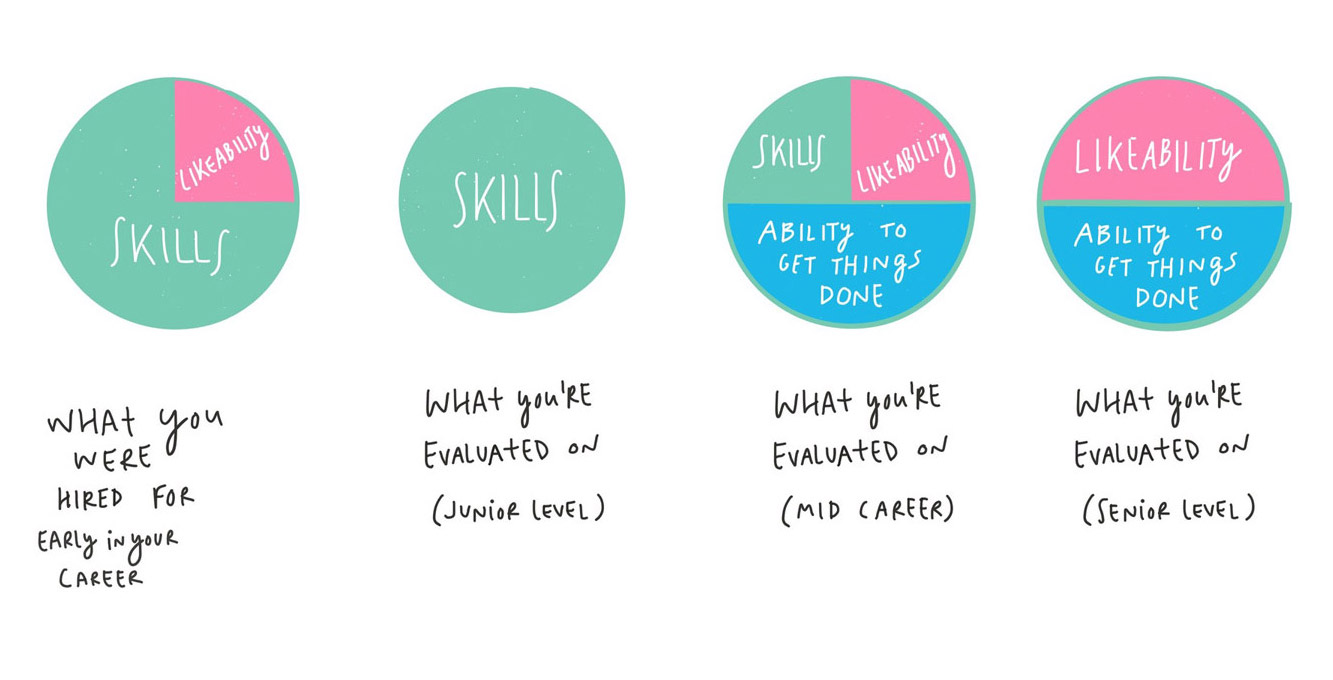Our brains are hardwired to make much of modern life difficult. This is especially true when it comes to dealing with uncertainty. On the bright side, if you know the right tricks, you can override your brain’s irrational tendencies and handle uncertainty effectively.

Our brains give us fits when facing uncertainty because they’re wired to react to it with fear. In a recent study, a Caltech neuroeconomist imaged subjects’ brains as they were forced to make increasingly uncertain bets—the same kind of bets we’re forced to make on a regular basis in business.
The less information the subjects had to go on, the more irrational and erratic their decisions became. You might think the opposite would be true—the less information we have, the more careful and rational we are in evaluating the validity of that information. Not so. As the uncertainty of the scenarios increased, the subjects’ brains shifted control over to the limbic system, the place where emotions, such as anxiety and fear, are generated.

This brain quirk worked great eons ago, when cavemen entered an unfamiliar area and didn’t know who or what might be lurking behind the bushes. Overwhelming caution and fear ensured survival. But that’s not the case today. This mechanism, which hasn’t evolved, is a hindrance in the world of business, where uncertainty rules and important decisions must be made every day with minimal information.
As we face uncertainty, our brains push us to overreact. Successful people are able to override this mechanism and shift their thinking in a rational direction. This requires emotional intelligence (EQ), and it’s no wonder that—among the 1 million-plus people that TalentSmart has tested—90% of top performers have high EQs. They earn an average of $28,000 more per year than their low-EQ counterparts do.
To boost your EQ, you have to get good at making sound decisions in the face of uncertainty, even when your brain fights against this. Fear not! There are proven strategies that you can use to improve the quality of your decisions when your emotions are clouding your judgment. What follows are eleven of the best strategies that successful people use in these moments.
1. They quiet their limbic systems
The limbic system responds to uncertainty with a knee-jerk fear reaction, and fear inhibits good decision-making. People who are good at dealing with uncertainty are wary of this fear and spot it as soon as it begins to surface. In this way, they can contain it before it gets out of control. Once they are aware of the fear, they label all the irrational thoughts that try to intensify it as irrational fears—not reality—and the fear subsides. Then they can focus more accurately and rationally on the information they have to go on. Throughout the process, they remind themselves that a primitive part of their brain is trying to take over and that the logical part needs to be the one in charge. In other words, they tell their limbic system to settle down and be quiet until a hungry tiger shows up.
Like this Article ? Share It ! You now can easily enjoy/follow/share Today our Award Winning Articles/Blogs with Now Over 800K+ Growing Participates Worldwide in our various Social Media formats below:
FSC LinkedIn Network: (Over 10K+ Members & Growing !) www.linkedin.com/in/frankfsc/en
Facebook: http://www.facebook.com/pages/First-Sun-Consulting-LLC-Outplacement-Services/213542315355343?sk=wall
educate/collaborate/network….Look forward to your Participation !
Continue of article:
2. They stay positive
Positive thoughts quiet fear and irrational thinking by focusing your brain’s attention on something that is completely stress-free. You have to give your wandering brain a little help by consciously selecting something positive to think about. Any positive thought will do to refocus your attention. When things are going well and your mood is good, this is relatively easy. When you’re stressing over a tough decision and your mind is flooded with negative thoughts, this can be a challenge. In these moments, think about your day, and identify one positive thing that happened, no matter how small. If you can’t think of anything from the current day, reflect on the previous day or days or even the previous week, or perhaps you’re looking forward to an exciting event. The point here is that you must have something positive that you’re ready to shift your attention to when your thoughts turn negative due to the stress of uncertainty.
3. They know what they know—and what they don’t
When uncertainty makes a decision difficult, it’s easy to feel as if everything is uncertain, but that’s hardly ever the case. People who excel at managing uncertainty start by taking stock of what they know and what they don’t know and assigning a factor of importance to each. They gather all the facts they have, and they take their best shot at compiling a list of things they don’t know, for example, what a country’s currency is going to do or what strategy a competitor will employ. They actually try to identify as many of these things as possible because this takes away their power.
4. They embrace that which they can’t control
We all like to be in control. After all, people who feel like they’re at the mercy of their surroundings never get anywhere in life. But this desire for control can backfire when you see everything that you can’t control or don’t know as a personal failure. People who excel at managing uncertainty aren’t afraid to acknowledge what’s causing it. In other words, successful people live in the real world. They don’t paint any situation as better or worse than it actually is, and they analyze the facts for what they are. They know that the only thing they really control is the process through which they reach their decisions. That’s the only rational way to handle the unknown, and the best way to keep your head on level ground. Don’t be afraid to step up and say, “Here’s what we don’t know, but we’re going forward based on what we do know. We may make mistakes, but that’s a lot better than standing still.”
Bringing It All Together: The ability to strategically manage ambiguity is one of the most important skills you can cultivate in an increasingly uncertain business environment. Try the strategies and your ability to handle uncertainty will take a huge step in the right direction.
5. They focus only on what matters
Some decisions can make or break your company. Most just aren’t thatimportant. The people who are the best at making decisions in the face of uncertainty don’t waste their time getting stuck on decisions where the biggest risk is looking foolish in front of their co-workers. When it comes down to it, almost every decision contains at least a small factor of uncertainty—it’s an inevitable part of doing business. Learning to properly balance the many decisions on your plate, however, allows you to focus your energy on the things that matter and to make more informed choices. It also removes the unnecessary pressure and distraction caused by a flurry of small worries.
6. They don’t seek perfection
Emotionally intelligent people don’t set perfection as their target because they know there’s no such thing as a perfect decision in an uncertain situation. Think about it: human beings, by our very nature, are fallible. When perfection is your goal, you’re always left with a nagging sense of failure, and you end up spending your time lamenting what you failed to accomplish and what you should have done differently, instead of enjoying what you were able to achieve.
7. They don’t dwell on problems
Where you focus your attention determines your emotional state. When you fixate on the problems that you’re facing, you create and prolong negative emotions and stress, which hinders performance. When you focus on actions to better yourself and your circumstances, you create a sense of personal efficacy that produces positive emotions and improves performance. Emotionally intelligent people don’t allow themselves to become preoccupied with the uncertainties they face. Instead, they focus all their attention and effort on what they can do, in spite of the uncertainty, to better their situation.
8. They know when to trust their gut
Our ancestors relied on their intuition—their gut instinct—for survival. Since most of us don’t face life-or-death decisions every day, we have to learn how to use this instinct to our benefit. Often we make the mistake of talking ourselves out of listening to our gut instinct, or we go too far in the other direction and impulsively dive into a situation, mistaking our assumptions for instincts. People who successfully deal with uncertainty recognize and embrace the power of their gut instincts, and they rely on some tried-and-true strategies to do so successfully:
They recognize their own filters. They’re able to identify when they’re being overly influenced by their assumptions and emotions or by another person’s opinion, for example. Their ability to filter out the feelings that aren’t coming from their intuition helps them focus on what is.
They give their intuition some space. Gut instincts can’t be forced. Our intuition works best when we’re not pressuring it to come up with a solution. Albert Einstein said he got his best ideas while sailing, and when Steve Jobs was faced with a tough problem, he’d head out for a walk.
They build a track record. People who deal well with uncertainty take the time to practice their intuition. They start by listening to their gut on small things and seeing how it goes so that they’ll know whether they can trust it when something big comes around.
9. They have contingency plans . . .
Staying on top of uncertainty is as much about planning for failure as it is about hoping for the best. Experts at handling uncertainty aren’t afraid to admit that they could be wrong, and that frees them up to make detailed, rational, and transparent contingency plans before taking action. Successful people know they aren’t always going to make the right decision. They know how to absorb and understand mistakes so that they can make better decisions in the future. And they never let mistakes get them down for too long.
10. . . . but they don’t ask, “What if?”
“What if?” statements throw fuel on the fire of stress and worry, and there’s no place for them in your thinking once you have good contingency plans in place. Things can go in a million different directions, and the more time you spend worrying about the possibilities, the less time you’ll spend focusing on taking action that will calm you down and keep your stress under control. Successful people know that asking “what if?” will only take them to a place they don’t want, or need, to go to.
11. When all else fails, they breathe
You have to remain calm to make good decisions in the face of uncertainty. An easy way to do this lies in something that you have to do every day anyway—breathing. The practice of being in the moment with your breathing trains your brain to focus solely on the task at hand and quiets distracting thoughts. When you’re feeling overwhelmed, take a couple of minutes to focus on your breathing. Close the door, put away all other distractions, and just sit in a chair and breathe. The goal is to spend the entire time focused only on your breathing, which will prevent your mind from wandering. Think about how it feels to breathe in and out. This sounds simple, but it’s hard to do for more than a minute or two. It’s all right if you get sidetracked by another thought—this is sure to happen at the beginning—and you just need to bring your focus back to your breathing. If staying focused on your breathing proves to be a real struggle, try counting each breath in and out until you get to twenty, and then start again from one. Don’t worry if you lose count; you can always just start over. This task may seem too easy or even a little silly, but you’ll be surprised by how calm you feel afterward and how much easier it is to let go of distracting thoughts that otherwise seem to lodge permanently inside your brain.
Bringing It All Together
The ability to strategically manage ambiguity is one of the most important skills you can cultivate in an increasingly uncertain business environment. Try the strategies above, and your ability to handle uncertainty will take a huge step in the right direction.
How do your skills measure up? What do you do when faced with uncertainty? Please share your thoughts in the comments section below as I learn just as much from you as you do from me.
Travis co-wrote the bestselling book Emotional Intelligence 2.0 and co-foundedTalentSmart, the world’s #1 provider of emotional intelligence tests and training, serving 75% of Fortune 500 Companies.
Forbes.com | December 21, 2015 | Travis Bradberry
















